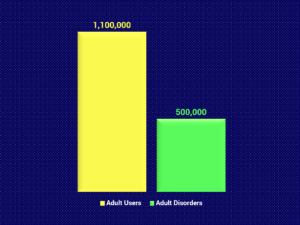Medical Pot Laws = 1.1 Million New Adult Users
 Researchers examined three national surveys spanning 20 years to determine whether illicit marijuana use and disorders increased among adults in states that passed medical marijuana laws compared to states that did not. They found that between 1991 and 2012, an additional 1.1 million adult illicit marijuana users and an additional 500,000 adults with a DSM-IV-diagnosed marijuana use disorder may be attributable to the passage of medical marijuana laws. This represents a serious public health problem, they say.
Researchers examined three national surveys spanning 20 years to determine whether illicit marijuana use and disorders increased among adults in states that passed medical marijuana laws compared to states that did not. They found that between 1991 and 2012, an additional 1.1 million adult illicit marijuana users and an additional 500,000 adults with a DSM-IV-diagnosed marijuana use disorder may be attributable to the passage of medical marijuana laws. This represents a serious public health problem, they say.
The 1991-1992 survey found that use was 69 percent higher and disorders were 80 percent higher among California adults compared to other states. California was the first state to legalize pot for medical use in 1996. It showed no increase in use or disorders, likely because these numbers were so high already. In the other early medical marijuana states, however, the laws contributed to higher rates of use and disorders while these measures were declining nationwide. During the later period (2001-2002 to 2012-2013) when more states passed medical marijuana laws, “illicit use increased significantly more in these states than in non-medical marijuana states.
The study, published in JAMA Psychiatry, was accompanied by an editorial which noted that psychiatrists need to understand the impact of marijuana laws for several reasons. 1) People “with mental illness are more likely to use marijuana, and both acute intoxication and chronic use can exacerbate psychiatric symptoms.” 2) Early marijuana use is associated with onset of psychosis and risk for suicide. 3) Marijuana use can interfere with the treatment of mental disorders.
Read Reuters story here. Read JAMA Psychiatry Study here. Read JAMA Psychiatry Editorial here.
Drugged Driving Now Kills More Drivers than Drunk Driving
For the first time, in 2015 (the latest year data is available) more drivers killed in auto crashes tested positive for drugs than alcohol, according to an updated report from the Governors’ Highway Safety Association and the Foundation for Advancing Alcohol Responsibility. The former is a nonprofit association representing the highway safety offices of the states, DC, US territories, and Puerto Rico. The latter is a nonprofit leading the fight to eliminate drunk driving and underage drinking and is financed by many alcohol distillers.
Drugs were present in 43 percent of fatally injured drivers with known test results, appearing more frequently than alcohol. Of the 57 percent of fatalities tested, 35.6 percent were positive for marijuana.
Read press release here, where the report can also be downloaded.
Colorado: 56 Contaminated Pot Recalls in a Year and a Half and Counting …
Colorado legalized marijuana for medical use in 2000, for commercial production, processing, distribution, and sales via dispensaries in 2009, and for recreational use in 2012. The state did not require recreational pot to be tested for contaminants until 2014
. . . or marijuana for medical use until 2016.
On September 8, 2015, the City of Denver issued the first recall of contaminated products. Since then, 55 more recalls have taken place despite laws cracking down on the use of pesticides and requiring testing for marijuana potency and the presence of other contaminants.
Read story here.





Leave a Reply
Want to join the discussion?Feel free to contribute!